If you were at all interested in the ideas about race, football, and spanking I passed on yesterday, then you have to read this, from the next editor of Contexts magazine, Phil Cohen’s Family Inequality blog. It’s got a kind of weird title (“Survivor bias and the 92% of Southern Black men who support spanking”) and is a little long, but, wow, does it cover a lot of ground and brings some fascinating, on-the-spot data and analysis to bear these topics.
The news out of the NFL has been brutal these past few days, but certainly good evidence of my long-held conviction that sport is a powerful and important “contested terrain” for all manner of social issues, especially those pertaining to race. The issues and questions about corporeal punishment, race, and culture raised by the indictment, suspension, reinstatement, and re-suspension of Adrian Peterson of the Minnesota Vikings are at the top of that list of complicated social issues to which sport can help bring attention. But it is, as we sociologists like to say, really complicated. Below are a few brief but useful points and insights–the first, snippets from a 2012 New York Times commentary by Maryland sociologist Rashawn Ray; the second from a recent facebook post by Joe Soss, a sociologically-inclined political scientist who works in the public policy school here at the University of Minnesota.
First, a few empirical points from Ray’s 2012 commentary on race and spanking:
–“Blacks are more likely to spank their children.”
–“These punishing methods [also] differ by region and class.”
–“…corporal punishment in schools is allowed in Southern states;” and “…whites in the South more likely to spank than whites in the Northeast.”
–“Although some argue that spanking leads to physical aggression or passive-aggressiveness, the evidence is inconclusive.”
–“Altogether, spanking without communication is problematic and should not be used as the primary form of punishment.”
And this from Soss:
“In the wake of Adrian Peterson’s indictment, it’s remarkable how quickly the discussion has coalesced around the idea of a “racial divide” in cultures of parenting and corporal punishment. Some of the articles have been terrible; others have used the issue to say some smart things about race and ethnicity in America. But the focus of the conversation itself is a striking example of “racialization” in action. I’m not saying we should ignore the modest but persistent racial differences in opinion on this issue. But somewhere around 80% of *all* Americans say that spanking is sometimes appropriate. And depending on which polls you look at, the opinion gaps associated with racially identified groups are often smaller than differences associated with partisanship, ideology, religiosity, region, and age cohort. There is a lot going on here, it seems to me. But I’m reminded of something Ta-Nehisi Coates has often urged us to do: Pay close attention whenever widespread societal phenomena are reframed, for African Americans, as expressions of something distinctive to Blackness. Reflect on the ways this narrative implicitly exempts and exonerates Whiteness. Investigate how it moves from observations of small differences to claims of opposing group cultures. Ask what role it plays in constructing and reproducing understandings of racial otherness.”
None of this, I should note, is about the Peterson case itself; rather, it is about one of the larger sets of issues and debates that this case has given rise to.
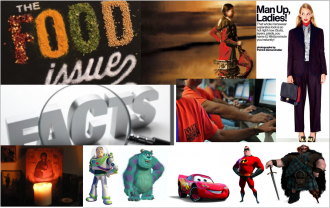 Oh hi. Between the start of the semester, sickness, and the mustering of a new grad board, the poor Roundup has gone un-rounded! Time to remedy that, with a Roundup of epic scale. There’s something for everyone, so let that sociological imagination run wild! And don’t forget, if you’re an educator or a student, to let us know how you’re using TSP in your classrooms. It always helps us find new directions!
Oh hi. Between the start of the semester, sickness, and the mustering of a new grad board, the poor Roundup has gone un-rounded! Time to remedy that, with a Roundup of epic scale. There’s something for everyone, so let that sociological imagination run wild! And don’t forget, if you’re an educator or a student, to let us know how you’re using TSP in your classrooms. It always helps us find new directions!
Features:
“The Feel of Faith,” by Daniel Winchester. Examining the physical artifacts of Eastern Orthodox worship.
Office Hours:
“Ken Kolb on Moral Wages,” with Matt Gunther. A podcast on why public servants persevere, even when they don’t profit.
There’s Research on That!:
“Crime and Scandal in the NFL,” by Ryan Larson. There isn’t a higher incidence of crime among NFL players, but there is a higher incidence of domestic violence; public outrage rises when punishments don’t seem to align with crimes; and how organizations handle scandal.
“Homelessness at the VMAs,” by Jacqui Frost. Framing social problems and the “deserving” needy. more...
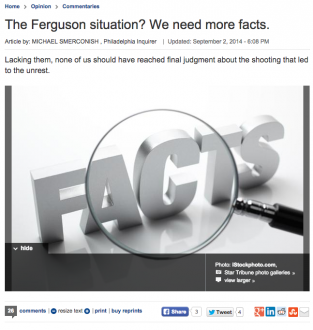
Welcome back! Wait, many of you never went anywhere. You’ve been reading TSP all summer. You guys have been great. It was me who’s been on hiatus, buried in book writing among other things. (One of those manuscripts, on migration with Syed Ali, is done; another, my long-suffering study of midnight basketball, is close… very close.) Anyway, with the start of a new academic year, I always feel a little like Mr. Kotter.
I am excited about the year ahead. On the teaching front, I’ll be offering—for the first time—a new graduate seminar on “great books” in sociology, a course that grew out of a few posts I did wrote winter, right here on The Society Pages. In terms of the website, we’ve got a great new graduate student board shaping up and we are just about ready to unveil a facelift for TSP (we think it’s pretty sweet).
One of our goals for The Society Pages this year, both online and in our social media, is to do a better job of covering the field of sociology taken as a whole. That’s no easy task. Some of this will involve bringing in more content on topics where there is a lot of great sociological research and writing, but that hasn’t been represented well on our site to date: for example, education, health and medicine, population studies. But doing a better job of covering the field also includes bringing in types of research that are also difficult to find on the web, but needed more than ever: basic social facts, emerging demographic trends, and empirical evaluations of public policy and conventional wisdom. For reasons that aren’t too hard to figure, there’s a lot of opinion and editorializing online, but not nearly so much accumulation and reporting of social facts and useful empirical information.
As fate would have it, our local newspaper ran two big pieces on the OpinionExchange page this very morning that seem to underscore these points and goals. One was about “the situation” in Ferguson, the other about the proliferation of flawed studies—what the author calls “pop-sociology and pop-psychology” in the news and in our social media streams. The former argued the need for more information before taking stands on Mike Brown’s death and its aftermath (though it didn’t have much to say about the broader social contexts and public policies sociologists have focused on in recent weeks). The latter was about how scholars in certain fields still seem to misunderstand the difference between correlation and causation. Specifics aside, both ran under the subtitle: “We need more facts.” We here at TSP couldn’t agree more—and will do our best to help provide those in the weeks and months ahead.
—–
A few resources for the interested reader hoping for a little social science around that “Ferguson situation”:
“Reflecting on Ferguson? There’s Research on That!”
“Social Fact: The Homicide Divide.”
“Social Fact: Death—Not the Great Equalizer?”
“Explaining and Eliminating Racial Profiling.”
The Chronicle of Higher Education: “How Professors in St. Louis are Teaching the Lessons of Ferguson’s Unrest.”
The Washington Post Wonkblog: “How Decades of Criminal Records Hold Back Towns Like Ferguson.”
“The Average White American’s Social Network is 1% Black.”
“What Are Rappers Really Saying About the Police?”
“The Role of Empathy in Crime, Policing, and Justice.”
“Failing to Understand When Non-White People Distrust the Police.”
“How Targeted Deterrence Helps Police Reduce Gun Deaths.”
“Roundtable: Social Scientists Studying Social Movements.”
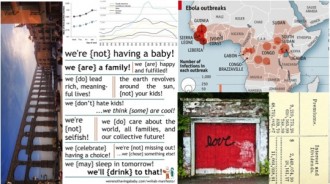 As so much of the sociological knowledge bank begins packing their bags for San Francisco, we here at TSP are keeping it lively with timely works on deportation, urban planning, the social structure of time, pandemics, and statistically significant others. Enjoy!
As so much of the sociological knowledge bank begins packing their bags for San Francisco, we here at TSP are keeping it lively with timely works on deportation, urban planning, the social structure of time, pandemics, and statistically significant others. Enjoy!
Features:
“What’s Missing from the Debate Over Deportation Numbers,” by Tanya Golash-Boza. The laws surrounding immigration and removal have not changed, but enforcement sure has.
Citings & Sightings:
“Urban Planners in Zaragoza Test the Waters,” by Andrew Wiebe. An “embedded sociologist” at a Spanish NGO works to reduce water demands in drought-plagued city. more...
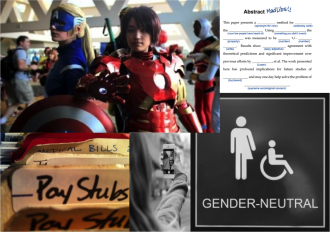 Features:
Features:
“Comic-Conned: Gender Norms in a Carnivalesque Atmosphere,” by Natalie Wilson. In cultural events meant to be utopian for their subculture, you can be anything or anyone—but gender norms are hard to shake.
Roundtables:
“Looking into the Racial Wealth Gap with Dalton Conley, Rachel Dwyer, and Karyn Lacy,” by Erin Hoekstra. In another piece from our series on debt, Hoekstra invites experts to examine the factors—from housing and homeownership, access to credit, predatory lending practices, and historically entrenched inequalities—that make the racial wealth gap so persistent.
Office Hours:
“Belinda Wheaton on the Cultural Practices of Lifestyle Sports,” with Kyle Green. Can surfing be an act of political resistance? It’s certainly an act of gender resistance for Jen Lee! more...
 Umm, you guys? Did you know July’s almost over? That’s… that’s too much to think about, really. So let’s talk about soc, baby.
Umm, you guys? Did you know July’s almost over? That’s… that’s too much to think about, really. So let’s talk about soc, baby.
Features:
“Of Carbon and Cash,” by Erin Hoekstra. Could reparations for environmental damage flow as easily as pollution from the Global North to the Global South?
Office Hours:
“Chad Lavin on Eating Anxiety,” with Matt Gunther. On the politics of our food choices.
There’s Research on That!
“When Child Migrants Weren’t an Unwelcome Problem,” by Lisa Gulya and Stephen Suh. While politicians are busy blaming each other (slash coming up with conspiracy theories) for a recent influx of minor immigrants, research shows times when the U.S. has happily welcomed such kids. more...

We place a high value on collaborative conversations at TSP. That’s one of the reasons we’re so delighted to welcome Feminist Reflections to our community pages. Gayle Sulik’s inaugural post offers a thoughtful invitation to a new space for engaging in feminist conversations about everyday life, for expanding feminist networks, and for celebrating feminist work.
We need a formal communal setting that is open to intellectual curiosity, the musings of everyday life and the emotions that set their tone, and the exploration of how ideas and knowledge are tied to power and influence. We need to contemplate poverty in the midst of riches, subjectivity and neutrality, public power and the linkages between meaning and power, and the social construction of knowledge (What counts as “knowledge”? Who has/lacks access? Who gets to create it?). We need to reflect, with a feminist perspective, on our lives as sociologists and human beings.
You can learn more about Tristan Bridges, another regular contributor, in this week’s fascinating Office Hours podcast on masculinities and sexual aesthetics. You’ll also find such scholars as Meika Loe, Trina Smith, and Amy Blackstone on Feminist Reflections. I’m personally excited to welcome Professor Blackstone to these pages, since few people have taught me more about the value and necessity of feminist perspectives in sociology. As we’ve coauthored seven pieces, I’ve felt fortunate to engage in the sort of productive back-and-forth that yields lasting insights as well as articles. We’re looking forward to engaging many more such collaborative conversations in Feminist Reflections.
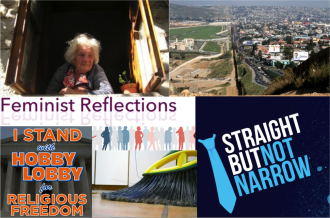 This week, TSP was pleased to welcome our latest Community Page, Feminist Reflections; to host Tristan Bridges (one of Feminist Reflections’ contributors) on Office Hours, and to talk baby contagions and blocking contraception at the Supreme Court. What else did we get up to?
This week, TSP was pleased to welcome our latest Community Page, Feminist Reflections; to host Tristan Bridges (one of Feminist Reflections’ contributors) on Office Hours, and to talk baby contagions and blocking contraception at the Supreme Court. What else did we get up to?
Office Hours:
“Tristan Bridges on Hybrid Masculinities and Sexual Aesthetics,” with Kyle Green. Being straight but not narrow and changing masculine norms along the way.
There’s Research on That!
“Religion, Reproduction, and the Supreme Court,” by Jacqui Frost. Hobby Lobby and Wheaton College’s cases before the SCOTUS reveal just one facet of the constraints on women’s access to reproductive health services. more...
 A lot can happen in just a couple of weeks. While we entertained illustrious guests (the incoming editors of Contexts magazine) and worked on developing new Community Pages, we saw the arrival of the paperbacks of our third W.W. Norton volume (this time on race and ethnicity in the U.S.), a plaudit as a great Twin Cities blog from the fine folks at The Tangential and Vita.MN, and, of course, the winning of the World Cup. We didn’t do that last one. But here’s the stuff we did do.
A lot can happen in just a couple of weeks. While we entertained illustrious guests (the incoming editors of Contexts magazine) and worked on developing new Community Pages, we saw the arrival of the paperbacks of our third W.W. Norton volume (this time on race and ethnicity in the U.S.), a plaudit as a great Twin Cities blog from the fine folks at The Tangential and Vita.MN, and, of course, the winning of the World Cup. We didn’t do that last one. But here’s the stuff we did do.
Features:
“Economic Decline and the American Dream,” by Kevin Leicht. The second in a three-part series reveals that the U.S. has the lowest rate of social mobility in the industrialized world.
“Old Narratives and New Realities,” by Kevin Leicht. Why old-school parents really just don’t understand the financial precarity of modern early adulthood in the conclusion to Leicht’s series.
“Andrew Ross on the Anti-Debt Movement,” by Erin Hoekstra. A conversation with a scholar-activist about the whys and hows of dumping debt. more...
